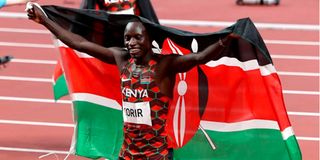How Kenya lost its Olympic groove

Kenya's Emmanuel Kipkurui Korir celebrates after winning the men's 800m final at Tokyo 2020 Olympic Games on August 4, 2021.
What you need to know:
- It is not that African athletes have got worse rather than rivals elsewhere having become better.
- Worryingly, the African diaspora, is rising rapidly in sports, eating the lunch of their relatives back on the continent.
In a few days, the delayed 2020 Olympic Games in Tokyo will be done and dusted. Before it, the last Olympics in Brazil’s commercial capital Rio de Janeiro in 2016 were a good hunting season for Kenya. It was 15th highest in the medal standings and the highest-placed African nation, taking home a decent haul of six golds, six silvers and one bronze.
Kenya now doesn’t have a path to six golds and is unlikely to place in the top 30 in the medal winnings. And, as the continent’s leading medal winner, it means no African country will be in the top 30. On the whole, though, it has been a better Olympics for Africa, with many more countries winning silver and bronze, and placing in the top 80, than in Rio. Ghana, for example, won bronze in boxing, its first medal in the Olympics since 1992.
We have been caught out. It is not that African athletes have got worse rather than rivals elsewhere having become better. Worryingly, the African diaspora, especially in Europe and North America, is rising rapidly in sports, eating the lunch of their relatives back on the continent.
There has also been a shift in athletics that we have witnessed in football with record numbers of African sportsmen and women running in international championships and marathons where they get paid handsomely, often back to back. They exhaust themselves, making the money that puts food on the table for their families, and when it comes to running for country and flag, one cannot help but feel that there is less passion.
Not only don’t they get paid but are sometimes treated shabbily with officials of their sporting bodies stealing the allowances and even sexually harassing some of the female athletes. The Olympics, then, become little more than a pro forma appearance.
Kenya’s intriguing case
Something more fundamental, however, seemed to have changed in many African countries in the four years, and it has nothing to do with the gloom of the Covid-19 pandemic that the rest of the world has shared equally. Ethiopia, for example, doesn’t have any of the Dibaba sisters in the Tokyo contingent. The cheery-faced Genzebe Dibaba not only lit up the track but oozed a lot of positive energy.
Ethiopia’s squad in Tokyo is glum — a reflection of the bad air that has settled over the country since the war in Tigray broke out last year. At, especially, the 2012 Olympics in London, the Ethiopians came to the Games with a deserved extravagant spring in their step. Addis Ababa was Zion, and in the general optimism and “Africa Rising” vibes then sweeping the continent, Ethiopia looked destined to scale the highest of mountains.
South Africa, another big contributor to Africa’s Olympics medal cabinet, is, according to some readings of its state, falling apart. Recently, it was roiled by a frenzy of looting that perhaps no country has ever witnessed in peacetime. The ruling African National Congress (ANC) has been eating the country, and now finally only bone is left. President Cyril Ramaphosa came to the job perhaps too late and has some reformist credentials, unlike the thuggish Jacob Zuma that he replaced. A gentleman, he is, however, considered weak, unable to show a decisive hand when it is necessary.
Kenya’s case is the intriguing one. It is neither in Ethiopia’s situation, nor has it fallen down the hole as far as South Africa. However, public anger at the government and cynicism at politics are off the charts and corruption has alienated large sections of the public in extreme ways.
Nobody is afraid of Kenya
The public mood in Kenya is as foul as its unseasonable weather. The ICC Consensus that forged the unlikely but electorally lethal alliance between President Uhuru Kenyatta and his deputy William Ruto in 2013 has dramatically come unstuck. The only surprise now is that they have not yet formally filed divorce papers in court.
The attempt to craft a future political dispensation with the Building Bridges Initiative-inspired constitution amendment ran into the divisive headwinds sweeping the country. The uncertainty about the future, particularly the 2022 elections, stands like a giant obelisk in Uhuru Gardens.
Kenya’s athletics suddenly has no figure with an inspiring story like javelin world champion Julius Yego, or the tall charismatic David Rudisha, the 2012 and 2016 Olympic champion, two-time World Champion, and world record holder in the 800 metres. You got the feeling that people feared to line up against Rudisha. At these Games, nobody is afraid of Kenya.
Most crucially, Africa has to diversify beyond track and field and go into rowing, archery judo, curling, cycling, [rifle] shooting (the way we kill ourselves in wars and the security forces shoot people you’d think we’d be there) and others. At this year’s Olympics, before most of Africa took to the field in large numbers, more than 100 medals in these seemingly obscure sports had been dished out.
We’ll never get 30 per cent of the medal pie while we fight for only 15 per cent of it.
Mr Onyango-Obbo is a journalist, writer, and curator of the Wall of Great Africans. @cobbo3





